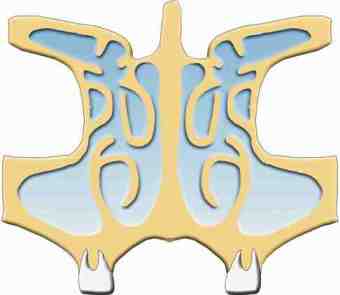
A sylised diagram of the nasal sinuses
Sinusitis
What are the Sinuses?
We all have sinuses. There are 4 pairs of sinuses: the maxillary sinuses (in your cheeks), ethmoid sinuses (between your eyes), frontal sinuses (in your forehead), and sphenoid sinuses (in the middle of your skull). The lining of the sinuses produce mucous. Both the lining and the mucous help to fight infection and allergy, and clear the nose of particles such as dust and dirt. Your sinuses should be full of air. When healthy, they contribute to the quality of your voice and make your head weigh less.
What is Sinusitis?
Sinusitis is inflammation of the sinuses. Inflammation is commonly caused by allergy and infection, but there are also many other causes. The most frequent cause is the common cold. Sinusitis occurs when the drainage pathways from your sinuses becomes blocked. This causes pressure or heaviness in your face (particularly on bending forwards), a green discharge from your nose, loss of your sense of smell, and a blocked nose. You may also experience discomfort in your teeth.
What treatments are available?
The treatment for sinusitis is divided into medical (using medication) and surgical (using an operation), or a combination of both. Medical treatment centres around reducing inflammation in your nose. This is achieved using decongestants, anti-histamines and antibiotics. The treatments that are prescribed are different to those that you are able to buy over-the-counter at your local pharmacy. Please remember that it is not in your best interest to use over-the-counter nasal decongestants for longer than 3 or 4 days when you have a common cold. If medical therapy is not succesful at improving your symptoms, you may be a candidate for an operation. This is called sinus surgery. There are many different ways to perform sinus surgery, but most specialist sinus surgeons perform endoscopic sinus surgery.
What is Endoscopic Sinus Surgery?
An endoscope is a medical instrument used to examine the inside of your nose. The surgeon is able to look through the endoscope, which has a very bright light incorporated. Using the endoscope, the surgeon is able to examine the blocked passages of your nose and sinuses. Using tiny specialist instruments, the surgeon can treat these blockages very precisely. This is also called minimal-access or minimally-invasive surgery. This means that there will be no scars on your face after surgery, since the whole procedure is performed through your nostrils.
Is endoscopic sinus surgery painful?
It should not be. As the surgery is precisely performed and preserves normal lining in your nose, most patients should expect to have their post-operative pain controlled with Paracetamol. Sometimes, Codeine can help for breakthrough pain. Most specialist sinus surgeons do not use packing in your nose after sinus surgery. Having these packs removed from your nose the morning after surgery can be a particularly unpleasant experience.
Will I need to be on medication after sinus surgery?
Endoscopic sinus surgery helps to remove blockages, infection and polyps from your nose and sinuses. Quite often, the disease that caused your sinusitis will need to be controlled with medication after your surgery. You can discuss this with your surgeon at the time of your appointment.
Can anything go wrong during or after endoscopic sinus surgery?
In the hands of a specialist sinus surgeon, endoscopic sinus surgery is a very safe procedure. This is because your surgeon will have had specialist training to perform this type of surgery and will also perform a large number of sinus operations. However, it is important to realise that problems can happen, even in the most experienced hands. The sinuses sit in your cheeks, between your eyes, in your forehead, and in the middle of your skull. The bone of your eye socket and beneath your brain is very thin. There is, therefore, a possible risk of causing double vision, blindness, leakage of fluid from around your brain (CSF), a permanaent reduction or loss of your sense of smell, and bleeding from blood vessels inside your nose. After surgery, the main problems relate to infection (causing sinusitis) and bleeding. To help in planning your operation, your surgeon should arrange for you to have an X-ray investigation, called a CT scan of your sinuses. Your surgeon should be happy to discuss possible complications of surgery and should be able to give you their personal complication rate.
What should you do next?
If you would like to discuss your sinus symptoms with Mr Bhalla, please contact April (01625 430550 / 07507 782188 or april@managedmedical.co.uk) for an appointment or, fill out an online booking form.